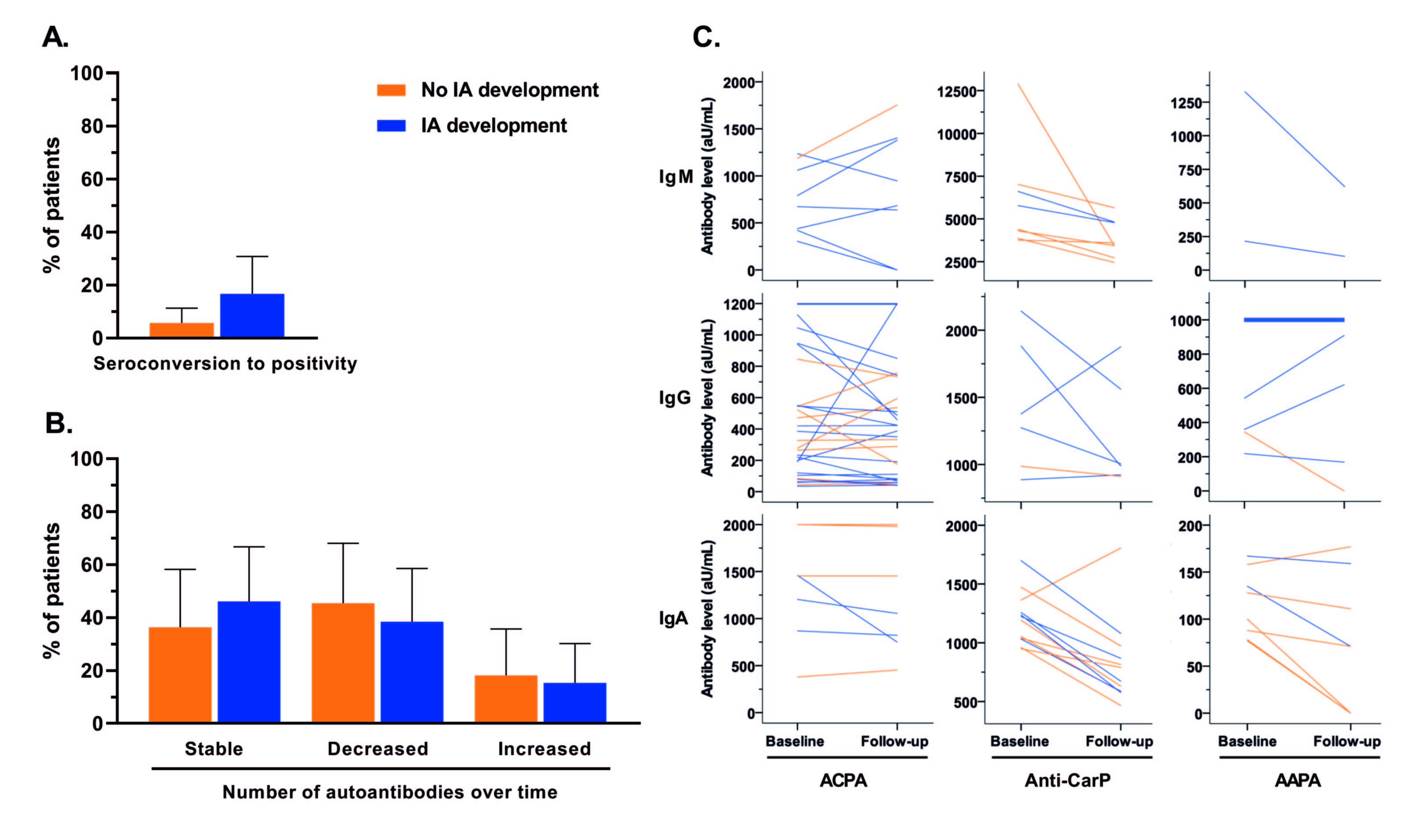Session Information
Session Type: Poster Session B
Session Time: 9:00AM-11:00AM
Background/Purpose: Auto-antibodies in rheumatoid arthritis (RA) are often present years before disease onset but their mere presence does not seem enough to induce RA. Several nested-case control studies have shown that autoantibody-response maturation precedes disease onset, suggesting its role in disease triggering. At present, it is undetermined whether autoantibody-response maturation occurs in the symptomatic phase preceding clinical arthritis (i.e. clinically suspect arthralgia, CSA), or whether it only occurs earlier, in the asymptomatic phase. Likewise, if autoantibody-response maturation relates to disease-development, maturation is expected to be more pronounced in CSA-patients that progress to clinical arthritis compared to CSA-patients that do not. To better understand the relation between autoantibody-response maturation in time and RA-development, we performed a longitudinal study on autoantibody-response maturation in CSA-patients that did and did not progress to clinical inflammatory arthritis (IA).
Methods: In serum from 148 CSA-patients, we determined the presence and levels of anti-citrullinated, anti-carbamylated and anti-acetylated antibodies (ACPA, anti-CarP and AAPA), with three isotypes each (IgM, IgG and IgA), resulting in 9 autoantibody measurements per patient per time-point. In-house ELISA was used for all measurements. CSA-patients with paired samples at first presentation at the outpatient clinic and at IA-development (n=56) or else after 2-years (n=92) were selected. First, in patients negative for all measurements at baseline, we determined the frequency of conversion to seropositivity. Second, in patients with ≥1 positive autoantibody at baseline, we studied the frequency of autoantibody positivity over time. Finally, we determined changes in autoantibody levels in patients positive for the respective autoantibodies at baseline.
Results: In patients negative for all autoantibodies at baseline, 17% of patients that progressed to IA became positive, compared to 6% of ”non-progressors” (figure 1A, p=0.12). In patients with ≥1 autoantibody at baseline progressing to IA, the median number of autoantibodies was 1.5 (IQR 1-3, max. 6) at baseline and 1.0 (IQR 1-4, max. 6) at IA-development (p=0.18). In CSA-patients with ≥1 autoantibody at baseline not progressing to IA, this was 1.0 (IQR 1-2, max. 4) at baseline and 1.0 (IQR 0-2, max. 5) after 2-years (p=0.07). As shown in figure 1B; an increase in the number of autoantibodies was infrequent (15% in progressors, 18% in non-progressors (p=1.00)). Levels of autoantibodies did not significantly change over time (p-values ranging 0.25-1.00) both in progressors and non-progressors (figure 1C).
Conclusion: The presence and levels of IgM, IgG and IgA ACPA, anti-CarP and AAPA autoantibodies did not significantly increase over time in patients with CSA; this was similar for patients that did and did not develop clinical arthritis. These findings indicate that autoantibody-response maturation, as measured in this study, occurs in the vast majority of CSA-patients before presenting with symptoms and broadening of the autoantibody-response is not specific for progression from arthralgia to RA.
 Figure 1 Changes in autoantibodies over time: A) percentage of patients with seroconversion to positive in patients negative for all autoantibodies at baseline (n=100), B) percentage of patients that has an increasing, decreasing or stable number of positive measurements over time in patients positive for ≥1 autoantibodies at baseline (n=48), C) autoantibody levels over time in patients positive for the respective autoantibody at baseline. IA: clinical inflammatory arthritis, ACPA: anti-citrullinated protein antibodies, anti-CarP: anti-carbamylated protein antibodies, AAPA: anti-acetylated protein antibodies
Figure 1 Changes in autoantibodies over time: A) percentage of patients with seroconversion to positive in patients negative for all autoantibodies at baseline (n=100), B) percentage of patients that has an increasing, decreasing or stable number of positive measurements over time in patients positive for ≥1 autoantibodies at baseline (n=48), C) autoantibody levels over time in patients positive for the respective autoantibody at baseline. IA: clinical inflammatory arthritis, ACPA: anti-citrullinated protein antibodies, anti-CarP: anti-carbamylated protein antibodies, AAPA: anti-acetylated protein antibodies
To cite this abstract in AMA style:
Wouters F, Niemantsverdriet E, Salioska N, Dorjée A, Toes R, van der Helm - van Mil A. Does the Autoantibody-Response Mature Between Presentation with Arthralgia and Development of Rheumatoid Arthritis? – a Longitudinal Serological Study [abstract]. Arthritis Rheumatol. 2020; 72 (suppl 10). https://acrabstracts.org/abstract/does-the-autoantibody-response-mature-between-presentation-with-arthralgia-and-development-of-rheumatoid-arthritis-a-longitudinal-serological-study/. Accessed .« Back to ACR Convergence 2020
ACR Meeting Abstracts - https://acrabstracts.org/abstract/does-the-autoantibody-response-mature-between-presentation-with-arthralgia-and-development-of-rheumatoid-arthritis-a-longitudinal-serological-study/
